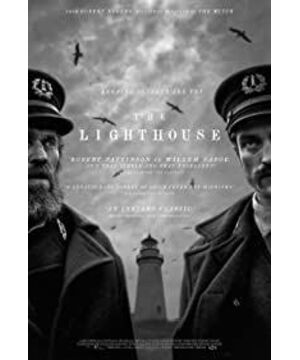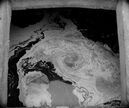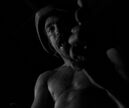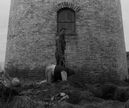Even if storms on land stop, island rains can last for months - Lighthouse Lighthouse
Comparing the absurdity and confusion of social events with the increasing realism of contemporary literary and artistic works, we will find that the so-called truth-fiction has changed from a simple binary opposition to a magical surreal intertextuality and complicity. The much-discussed "Parasite" and "Joker" are both typical representatives of this. Director Eggers’s focus continues to focus on marginal spaces and character relationships far from the center. This microscopic perspective makes The Lighthouse seem to be in line with Foucault’s claim that “the consequences of domination and institutions are examined from the details of power relations”. Eggers artistically processes the original narrative against the background of New Ireland's geographic folklore and maritime legends, making the film an apocalyptic creation that blends local strangeness and psychological depth. The film-like style makes The Lighthouse, in a way, with the artistic ambitions of Hitchcock-era black-and-white thrillers. And a series of retro light and color applications, the solitary and gloomy atmosphere and the crime plot respond in a faithful and loose way to the cruelty and resistance motives brewing in American noir films in the 1950s.
Chapter 11 of the Bible, Old Testament, Genesis is about the Tower of Babel. At that time, mankind united to build a tower that they hoped would lead to heaven; this act offended God. In order to stop the plan of human beings, God made human beings speak different languages, so that human beings cannot communicate with each other, the plan failed because of this, and human beings have been scattered since then. So "Babel" also has a chaotic meaning. Human hubris has ended in chaos.
Pattinson with sharp cheekbones interprets an introverted and gloomy apprentice seaman in the film, his white eyes are full of vigilance in the dullness, and the unfathomable hostility is precipitated in the bleak seascape. He consciously used silence to digest the old seaman's demonstration-like farting and poor accommodation, and quietly hid the naked mermaid in his arms. The two talked about the lighthouse at dinner. Pattinson didn't drink and ignored the old sailor's nonsense about the legend of Aquaman. He said that he wanted to climb to the top of the tower and get a glimpse of the truth of the light. The reason and distinction for the management of the lighthouse is so legitimate: according to the regulations, two personnel are on duty by rotation. The announcement, however, fueled a sense of crisis among the old seafarers about their status. Obviously, he didn't like sharing an equal schedule with an outsider with no sailing experience. He ignored the system, modified the rules without authorization, and set the top level of the lighthouse as a restricted area for management. Thus, the imagination mixed with authority, sacredness, poetry and conspiracy adds a layer of mystery and suspense to the lighthouse. The shadow of the night and the towering height not only create space fear, but also strengthen a spiritual totem temperament. Pattinson's inexplicable stubbornness to the lighthouse makes the audience even more associative and suspicious of its identity and purpose. Around the lighthouse, the film constructs a mystery. But "The Lighthouse" does not exist for the purpose of revealing secrets. It is more like an alienated fable of the Tower of Babel. Humans delusionally intervene in the upper powers, but find that obstacles and predicaments actually come from their own kind. The film exiled two males with background and cultural barriers to the fringe, to examine the cycle of doom caused by discrimination and mutual crime, moral indulgence, depravity and avoidance between people due to their original differences. This also contributes to the terrifying side of the film.
A lonely island immersed in storms all year round, the lighthouse has become the most sturdy and towering landmark under the apocalyptic landscape, and it is also the holy fire that comforts the souls of the crew and protects their lives. The game around the lighthouse is an inequality of power born out of a range of differences between apprentices and veteran seamen in terms of their status, experience and background. Battling giant machinery, scorching coal stoves and fast-moving axles, Pattinson's sweaty naked body is a typical portrait of a low-level labor driven by the industrial capital system. His behavior of protesting and seeking "fair dialogue" because he could not bear the slave-like treatment of the old seamen also made the film enter into criticism and reflection on the bad reality of abuse of power and slavery. Pattinson's radical process from peeping at the light of the lighthouse from a distance to blatantly demanding job equality with old seafarers also exposed the mystery of his identity. It turned out that when he was a lumberjack in Canada, he murdered a colleague who often bullied him, and immigrated to the United States in order to avoid disaster. The murder and the floating corpse in the sea became Pattinson's most secret psychological trauma. After landing on the island, a series of forbearance, crazy work and obsession with the lighthouse implied that Pattinson hoped to obtain the pilgrimage qualification leading to redemption through self-imposed exile and penance to dispel his inner guilt. In the maritime culture, the lighthouse is known as St. Elmo's fire that guards sailors, and its light is the most sacred apparition ceremony. For a traumatized person, the lighthouse is also endowed with a certain redemptive effect. Just as the Tower of Babel in its original description is a symbol of the ascent and climbing of a fool who is eager to touch miracles and reshape themselves.
But the film's narrative clearly rejects this stereotypical religious response to the crime-redemption model - instead, Pattinson's experience of being oppressed and teased on the island is almost a replica of his logging experience. Whenever Pattinson's mental and physical endurance reaches its limit, a series of Crusoe-esque monsters emerge from his eyes, accompanied by floating corpses and rotting human heads. The film also emphasizes the internal morbid psychology and recurrent insanity syndrome of the protagonist through the close-up of the mermaid's hideous face, alien sex organs and the sea king covered in mucus. They show the inescapable criminal nightmare of the protagonist, and also make the state of male narcissism and idiosyncratic competition more three-dimensional and vivid. The film even enters into a meditation on identity and self-awareness when the fateful tide of history repeats itself. Pattinson, whose real name is Tom (Thomas), assassinated and replaced his colleague Winslow. The old seaman Thomas was also a liar who also killed his former deputy. He and Pattinson happened to have the same name. . The director uses the mouth of the old seaman to send out the most classic existential thinking according to local conditions: Who are you? Is it Tom (Thomas) or Winslow. How long did they stay on the island? Was the old seaman just a man he fancied (suggesting a split personality). The film seems to deny and overturn various known narratives and conclusions, but it also inspires more imagination and possibilities. The surreal alienation and deformation of different characters, personal memories and historical events demonstrate the wit and innovation of the film's techniques. And in the frenzy of revenge and calm contemplation, a confused spectacle is created, and the interconnected reality and fiction finally strengthen the noir direction and cultural depth of the film.
As the film nears the end, events also develop to a final climax. Pattinson kills the old seaman and buries him under the lighthouse, a scene that repeats his crime at the lumber mill. And when he finally broke through various obstacles and climbed to the top of the lighthouse, he was blinded by the heat wave of the incandescent lamp. The highlight effect reinforces the terrifying and pathetic tone. In a frantic howl, Pattinson fell off the moral tower and was beaten back to his original shape. At this point, his ending was like the prophecy about greed and shame left by the old seaman before he died, and he rolled to the bottom and died on the beach. The so-called truth is redemption is nothing but a misunderstanding and delusion. The film denies this excuse and superstition to whitewash sin. The true face of truth is above all judgment and punishment. A beacon of light is also a tomb of darkness, a desolate and ugly ruin—just like the doomed Tower of Babel.
Should pale death with treble dread
If it is a tragic death with sharp fear
Make the ocean cave our bed
Make ocean caves our shelter
God who hear'st the surges roll
may god hear the waves
Deign to save the suppliant soul
condescending to save our humble souls
- Lighthouse Lighthouse
PS All pictures are from the Internet
Welcome to "Wee Journal"
View more about The Lighthouse reviews











